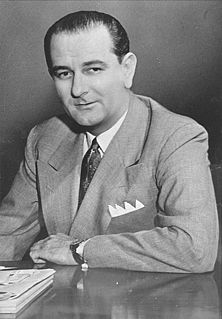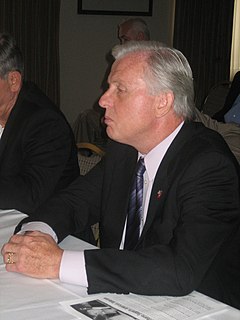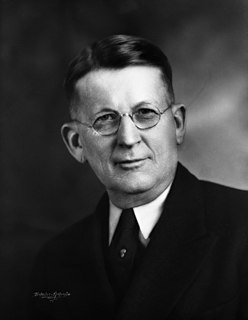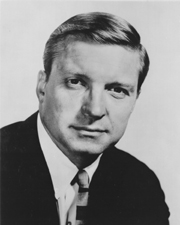
Sidney Preston Osborn was the first secretary of state of Arizona, and later the seventh governor of Arizona and is, as of 2019, the only governor of Arizona to be elected to four consecutive terms. Osborn is also the second native-born governor of Arizona, preceded by Thomas Edward Campbell.

Rawghlie Clement Stanford was the fifth governor of Arizona and served from 1937 to 1939. He later served on the Arizona Supreme Court from 1943 until 1955, including 3 years as Chief Justice.
Earl Farwell Dodge, Jr. was a long-term temperance movement leader and a politician of the Prohibition Party, from the U.S. state of Colorado.

The 1988 United States Senate elections was an election for the United States Senate in which, in spite of the Republican victory by George H. W. Bush in the presidential election, the Democrats gained a net of one seat in the Senate. Seven seats changed parties, with four incumbents being defeated. The Democratic majority in the Senate increased by one from 54/46 to 55/45.

The 1978 United States Senate elections in the middle of Democratic President Jimmy Carter's term. Thirteen seats changed hands between parties. The Democrats at first lost a net of two seats to the Republicans, and then one more in a special election. Democrats nevertheless retained a 58-41 majority.

John Wellborn Martin was an American politician. He was the 24th Governor of Florida, serving from 1925 to 1929. He also served as Mayor of Jacksonville, Florida, from 1917 to 1923. Born in Plainfield in Marion County, Florida, Martin and his family moved to Jacksonville in 1899. Despite only about four years of formal education, he studied law and was admitted to the Florida Bar in 1914. Three years later, Martin ran for Mayor of Jacksonville and easily defeated incumbent J. E. T. Bowden, becoming the city's youngest mayor at age 33. He would be easily re-elected twice in landslide victories, serving three consecutive terms in that office.

The 1954 United States Senate elections was a midterm election in the first term of Dwight D. Eisenhower's presidency. Eisenhower's Republican party lost a net of two seats to the Democratic opposition. This small change was just enough to give Democrats control of the chamber with the support of an Independent who caucused with them.

The 1998 Massachusetts gubernatorial election was held on November 3, 1998. Acting Governor Paul Cellucci was elected to his first term as Governor of Massachusetts.

Jack E. Wagner is a Democratic politician from Pennsylvania. He is a former State Auditor General, and has also served in the State Senate and Pittsburgh City Council.

John Thomas Watson was an American lawyer and politician who served as the 27th Attorney General of Florida from 1941 to 1949.
Franke Wilmer is an academic and a politician in the Democratic Party She was a member of the Montana House of Representatives, representing Districts 63 and 64 from 2007–2013. Before first running for office in 2006, Wilmer was appointed to chair the Montana Human Rights Commission by Governor Schweitzer in 2005. She received both a PhD and Masters from the University of Maryland in 1990 and is currently a full professor of Political Science at Montana State University.

The Pennsylvania gubernatorial election of 1994 was held on November 8, 1994. The incumbent governor, Bob Casey, Sr. (Democrat), was barred from seeking a third term by the state constitution. The Republican Party nominated Congressman Tom Ridge, while the Democrats nominated Mark Singel, Casey's lieutenant governor. Ridge went on to win the race with 45% of the vote. Singel finished with 39%, and Constitution Party candidate Peg Luksik finished third, garnering 12% of the vote.

A Massachusetts general election was held on November 5, 2002 in the Commonwealth of Massachusetts.

A Massachusetts general election was held on November 3, 1998 in the Commonwealth of Massachusetts.

A Massachusetts general election was held on November 6, 1990 in the Commonwealth of Massachusetts.

A Massachusetts general election was held on November 4, 1986 in the Commonwealth of Massachusetts.

The 1988 United States Senate election in Wisconsin took place on November 8, 1988. Incumbent Democratic U.S. Senator William Proxmire decided to retire, instead of running for re-election to a sixth full term. Democrat Herb Kohl won the open seat.

The Louisiana gubernatorial election of 1916 was held on April 18, 1916. Like most Southern states between the Reconstruction Era and the Civil Rights Movement, Louisiana's Republican Party was virtually nonexistent in terms of electoral support. This meant that the Democratic Party primary held on January 25 was supposed to be the real contest over who would be governor. However, in this particular election Progressive Party nominee John M. Parker ran an unusually competitive campaign, garnering 37% of the general election vote. The election resulted in the election of Democrat Ruffin G. Pleasant as governor of Louisiana.

The 1950 Arizona gubernatorial election took place on November 7, 1950. Incumbent Governor Dan Edward Garvey, who originally ascended to the office of Governor following the death of Sidney Preston Osborn and was later elected to a full term, lost the Democratic primary to state Auditor Ana Frohmiller. Frohmiller would become the first woman to be nominated by any party for governor in Arizona.

The Illinois gubernatorial election of 1964 was held in Illinois on November 3, 1964. The Democratic nominee, incumbent Governor Otto Kerner, Jr., won reelection against the Republican candidate, Charles H. Percy.





















